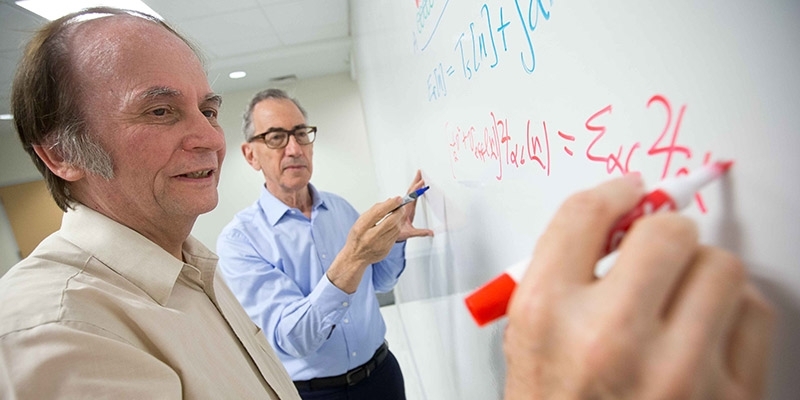Posted November 16, 2015
Perdew wins prestigious John Scott Award
The Carnell Professor is honored for his pioneering work on the density functional theory.

Ryan S. Brandenberg
Laura H. Carnell Professor of Physics and Chemistry John Perdew (left) is among an elite group of researchers and inventors to be honored with a Scott Award.
Marie Curie, Thomas Edison, R. Buckminster Fuller, Jonas Salk and Nikola Tesla; these are just a few of the legendary researchers and inventors who received The John Scott Award for contributing to the “comfort, welfare and happiness” of humankind.
This year, John Perdew, Laura H. Carnell Professor of Physics and Chemistry, joins this illustrious group for his groundbreaking role in the development of density functional theory, a computational modeling method used in physics, chemistry and materials science to investigate the structure of atoms, molecules, crystals, surfaces and their interactions.
“I have been lucky, and received a lot of help by others. I am honored and grateful.”
-- John Perdew, Laura H. Carnell Professor of Physics and Chemistry
In the early 1800s, John Scott, an Edinburgh chemist, set up a fund with the entity entrusted with the management of Benjamin Franklin’s legacy to bestow a small honorarium to “ingenious men or women who make useful inventions.”
The first awards were bestowed in 1834 to the inventors of a knitting machine and a door lock. Since the 1920s, most Scott Awards have gone to honorees in science and medicine, recognizing such contributions as the prevention of yellow fever and malaria and the development of penicillin. Today, the award is administered by a committee of Philadelphians appointed by the Board of Directors of City Trusts of the City of Philadelphia.
“When I was a graduate student of physics, there was no reason to expect that I would receive any honors, especially one shared by Smalley, Salk, Bardeen, Fleming, Langmuir, Tesla, Marconi, Edison and Curie,” said Perdew. “I have been lucky, and received a lot of help by others. I am honored and grateful.”
Perdew, one of the world’s most cited physicists, is the author of two works on the Thomson Reuters Web of Science list of the 100 most-cited research papers of all time. In 2014, he spearheaded Temple University’s successful application for a DOE New Energy Frontier Research Center. The $12 million grant will support Temple’s new Center for the Computational Design of Functional Layered Materials.
In honor of Perdew’s Scott Award, the College of Science and Technology (CST) will host a symposium on Friday, Nov. 20 that explores the current state of density functional theory and will feature distinguished scientists from Duke, Tulane and Johns Hopkins universities. For more information, visit the CST website.
This year’s second John Scott Award honoree also has a strong Temple connection. Madeleine Joullie, professor of chemistry at the University of Pennsylvania, serves on CST’s Board of Visitors. She was honored for her research on the synthesis of natural products, which has led to the creation of antiviral and antibacterial compounds.
Related stories:
—Greg Fornia